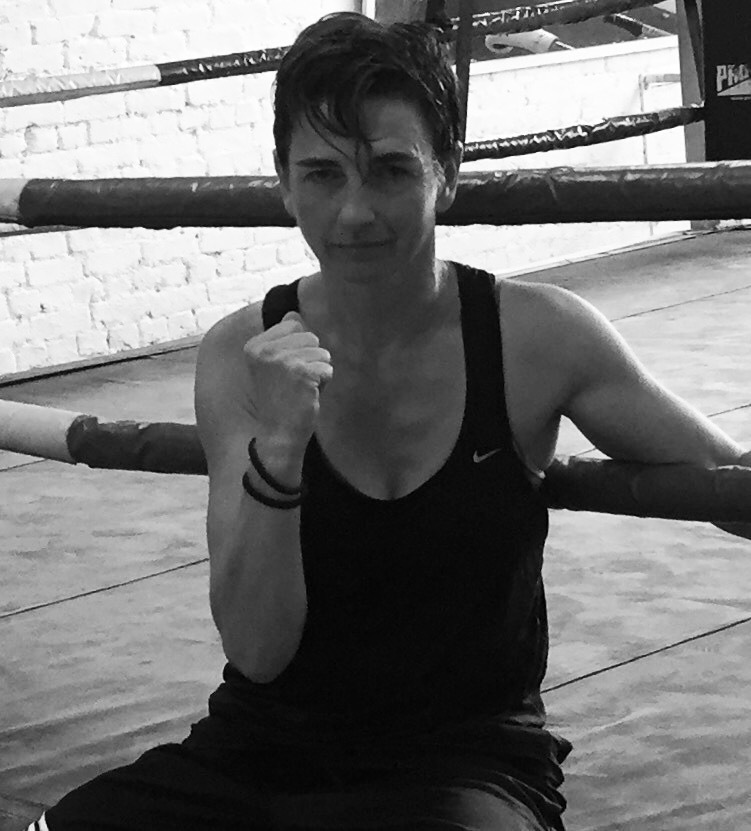
12 Jul A Sense of Direction – Kate (Kombat Kate) Waters
Kate Waters – AKA Kombat Kate – has had dozens of actors killed. She has had them shot. She has had them stabbed. She has had one drowned in a fish tank, and one strangled to death with a telephone cord. It is all part of the job when you are a fight director for stage and screen.
But even when rehearsing gruesome deaths for famous performers, Waters explains, it is important – both artistically and ethically – that violence on stage is not gratuitous. It must feel related to the plot, the people, and the production surrounding it.
“Violence on stage has to be there for a reason,” she explains. “It has to be completely motivated by the story, and the characters within that story reaching a tipping point. I’m not interested in gratuitous violence on stage. Fights have to be connected to everything that comes before and after them.”
Waters has been professionally choreographing fight scenes for twenty years. She grew up in Hampshire, learned judo as a child, studied acting at Middlesex University, where she excelled at stage combat – and not much else, she says – before training to become one of only a handful of Equity-registered fight directors in the late 1990s.
Her first professional production came in 2001 – Coriolanus at Bristol’s Tobacco Factory – and since then she has built a freelance career that has involved working with some of the country’s leading actors in some of the country’s biggest theatres. In recent years, she has staged fights with Ben Whishaw for the Bridge Theatre’s Julius Caesar, with James McAvoy for Jamie Lloyd’s Cyrano De Bergerac, and with Aiden Turner for the West End production of The Lieutenant of Inishmore.
***
Two decades as a professional fight director have taught Waters that some jobs – and some directors – are better than others, though.
“I enjoy working with directors who make the most of my skills and my experience,” Waters says. “I like directors who collaborate and have an open dialogue with me. That doesn’t mean they have to agree with me on everything, but it means there has to be a mutual respect between us.”
“What I don’t enjoy is going into a room and not feeling like I am part of the team,” she continues. “I don’t like feeling like I am expected to arrive, choreograph a fight, then leave. It can be very frustrating when you feel like your creative contribution isn’t valued by a director like that.”
Difficult situations like that are part of the reason Waters has started using the label “artist” to describe herself, and part of the reason she has started using her voice to advocate for more respect for the theatre industry’s freelancers. That means involving freelancers in decision-making, she says. It means offering them more support, both financial and otherwise. And it means making sure they get the professional acknowledgement they deserve.
“It wasn’t long ago that I worked on a really big show with a really big star, and wasn’t even credited alongside the rest of the crew,” she says. “It doesn’t matter whether you are a fight director, or a lighting designer, or a choreographer. They are all highly skilled jobs, and the people doing them deserve to feel seen and valued.”
***
When it comes to stage fights, it is also important that a director considers the full implications of the violence they are putting in front of an audience, says Waters. That, in other words, stage fights are not simply seen as cool additions to a show, but significant commitments that can bring with them a lot of traumatic, potentially triggering ramifications.
Take the Rodgers and Hammerstein musical Carousel, for example, which is about to be revived by director Timothy Sheader at Regent’s Park Open Air Theatre. Waters is working on it – it is her first live theatre job in a while – and says that the violence in the story has to be treated with the utmost care, for the sake of both audience and actors.
“The main character, Billy, actually commits domestic violence,” she explains. “People would not have questioned that as much when it was written, but nowadays you can’t just put that on stage and excuse it with a song or two. I spoke to Tim about it, and he explained that he didn’t want to avoid any of those issues. That was important to me.”
Stage fights can be the most memorable moments of a production, particularly for young, impressionable audiences, Waters says. It follows, therefore, that they need to be approached with the right attitude – and that the fight directors responsible for choreographing them are afforded the right recognition.
“It shouldn’t be seen as: ‘Oh, we’ve got to get a fight director in to stage a few moves safely’,” she says. “It should be seen as: ‘Oh, we need to get a fight director in because we need their skill and their expertise and their creativity in telling this part of the story really well.’”
Kate was interviewed for SDUK by Fergus Morgan
